Report: Legislations and Ethics in the Travel and Tourism Industry
VerifiedAdded on 2021/01/03
|13
|3392
|285
Report
AI Summary
This report delves into the multifaceted legal and ethical considerations within the travel and tourism industry. It begins by outlining the legal and regulatory frameworks, including key legislations such as the Development of Tourism Act, Transport Acts, Licensing Act, Disability Discrimination Act, and Trade Descriptions Act, as well as the roles of regulatory bodies like IATA and ABTA. The report then examines surface, sea, and air transport laws, including the Carriage of Passenger by Road Act, Regulation (EU) No. 1177/2010, Warsaw Convention, and Montreal Convention. It further analyzes the impacts of health, safety, and security legislations, such as the Health and Safety Act and Data Protection Act, alongside equality legislations like the Sexual Discrimination Act and Disability Discrimination Act. Contract and consumer protection legislations, including the Package Holiday Regulation, Trade Description Act, and Consumer Protection Act, are discussed in relation to customer rights. Finally, the report addresses ethical dilemmas and the role of Corporate Social Responsibility (CSR) within the industry, using Thomas Cook as a case study, providing a comprehensive overview of the legal and ethical landscape of travel and tourism.
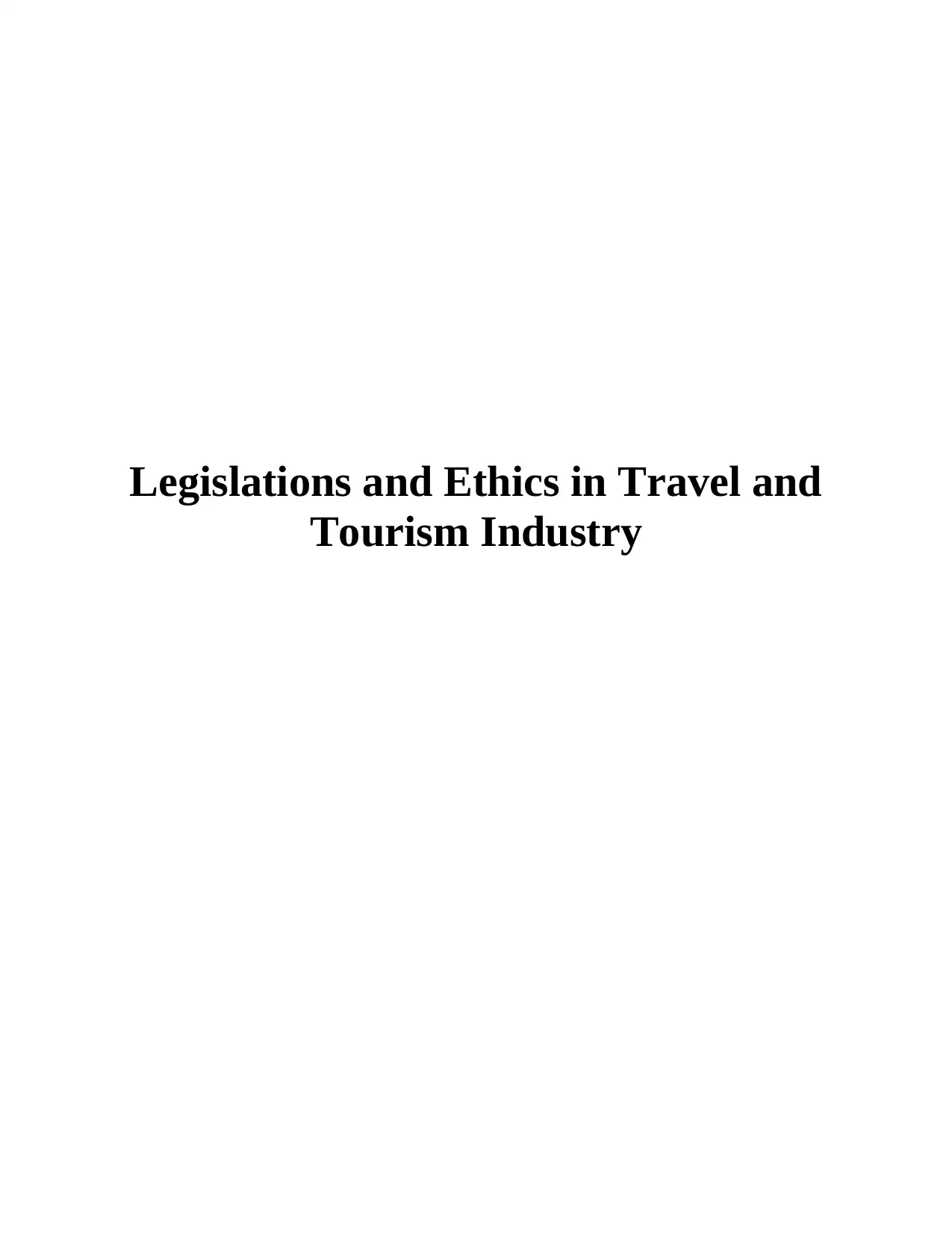
Legislations and Ethics in Travel and
Tourism Industry
Tourism Industry
Paraphrase This Document
Need a fresh take? Get an instant paraphrase of this document with our AI Paraphraser
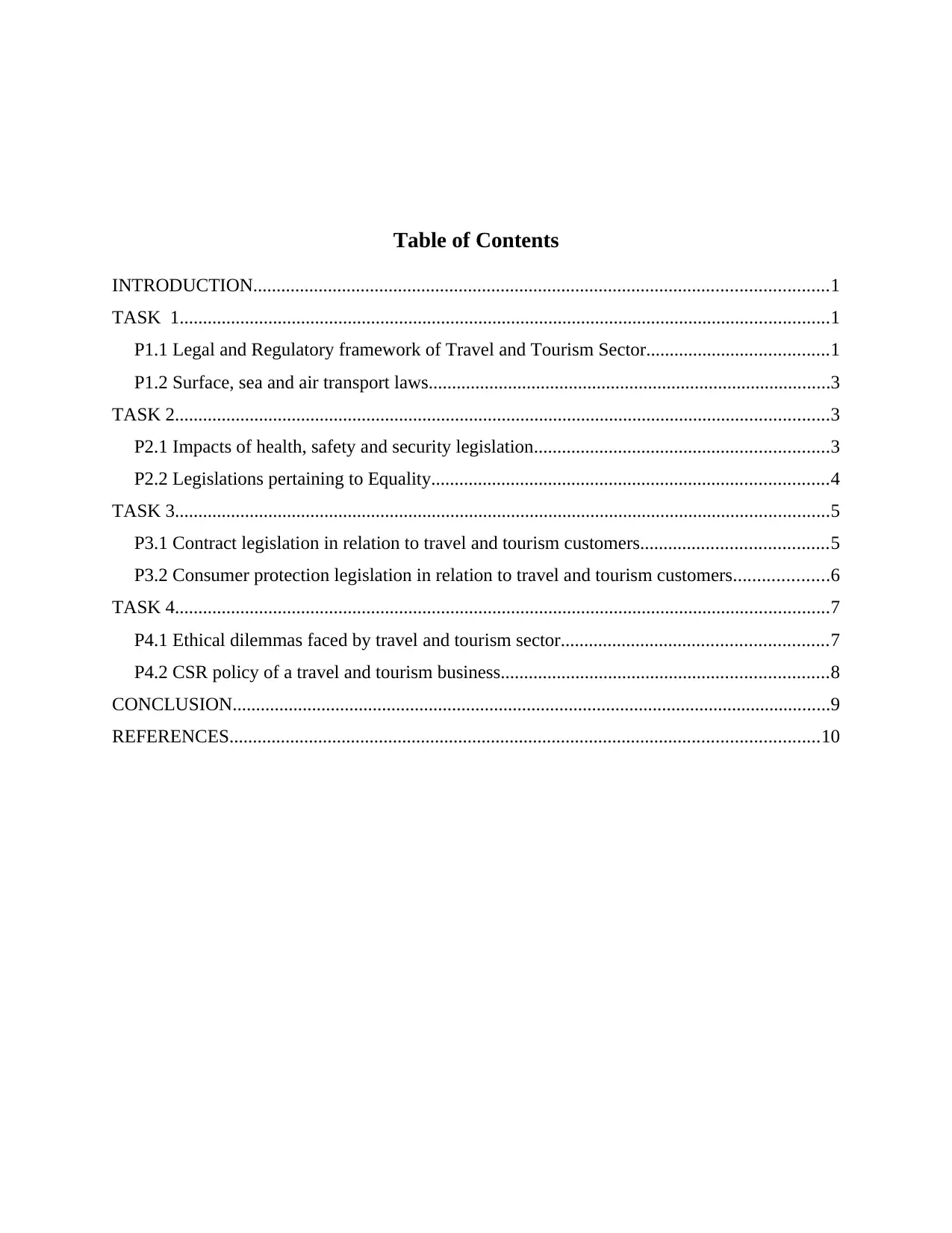
Table of Contents
INTRODUCTION...........................................................................................................................1
TASK 1...........................................................................................................................................1
P1.1 Legal and Regulatory framework of Travel and Tourism Sector.......................................1
P1.2 Surface, sea and air transport laws......................................................................................3
TASK 2............................................................................................................................................3
P2.1 Impacts of health, safety and security legislation...............................................................3
P2.2 Legislations pertaining to Equality.....................................................................................4
TASK 3............................................................................................................................................5
P3.1 Contract legislation in relation to travel and tourism customers........................................5
P3.2 Consumer protection legislation in relation to travel and tourism customers....................6
TASK 4............................................................................................................................................7
P4.1 Ethical dilemmas faced by travel and tourism sector.........................................................7
P4.2 CSR policy of a travel and tourism business......................................................................8
CONCLUSION................................................................................................................................9
REFERENCES..............................................................................................................................10
INTRODUCTION...........................................................................................................................1
TASK 1...........................................................................................................................................1
P1.1 Legal and Regulatory framework of Travel and Tourism Sector.......................................1
P1.2 Surface, sea and air transport laws......................................................................................3
TASK 2............................................................................................................................................3
P2.1 Impacts of health, safety and security legislation...............................................................3
P2.2 Legislations pertaining to Equality.....................................................................................4
TASK 3............................................................................................................................................5
P3.1 Contract legislation in relation to travel and tourism customers........................................5
P3.2 Consumer protection legislation in relation to travel and tourism customers....................6
TASK 4............................................................................................................................................7
P4.1 Ethical dilemmas faced by travel and tourism sector.........................................................7
P4.2 CSR policy of a travel and tourism business......................................................................8
CONCLUSION................................................................................................................................9
REFERENCES..............................................................................................................................10

⊘ This is a preview!⊘
Do you want full access?
Subscribe today to unlock all pages.

Trusted by 1+ million students worldwide
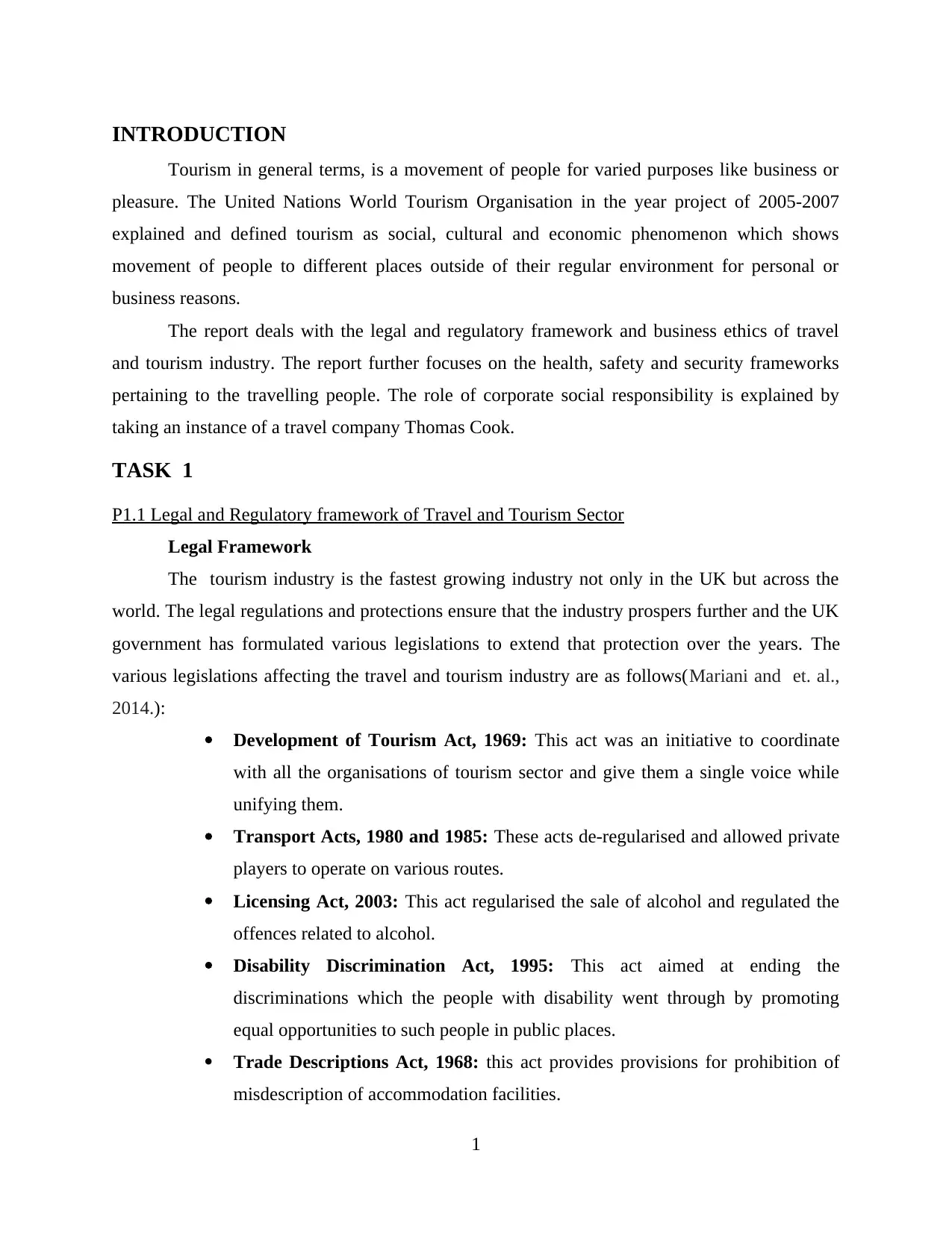
INTRODUCTION
Tourism in general terms, is a movement of people for varied purposes like business or
pleasure. The United Nations World Tourism Organisation in the year project of 2005-2007
explained and defined tourism as social, cultural and economic phenomenon which shows
movement of people to different places outside of their regular environment for personal or
business reasons.
The report deals with the legal and regulatory framework and business ethics of travel
and tourism industry. The report further focuses on the health, safety and security frameworks
pertaining to the travelling people. The role of corporate social responsibility is explained by
taking an instance of a travel company Thomas Cook.
TASK 1
P1.1 Legal and Regulatory framework of Travel and Tourism Sector
Legal Framework
The tourism industry is the fastest growing industry not only in the UK but across the
world. The legal regulations and protections ensure that the industry prospers further and the UK
government has formulated various legislations to extend that protection over the years. The
various legislations affecting the travel and tourism industry are as follows(Mariani and et. al.,
2014.):
Development of Tourism Act, 1969: This act was an initiative to coordinate
with all the organisations of tourism sector and give them a single voice while
unifying them.
Transport Acts, 1980 and 1985: These acts de-regularised and allowed private
players to operate on various routes.
Licensing Act, 2003: This act regularised the sale of alcohol and regulated the
offences related to alcohol.
Disability Discrimination Act, 1995: This act aimed at ending the
discriminations which the people with disability went through by promoting
equal opportunities to such people in public places.
Trade Descriptions Act, 1968: this act provides provisions for prohibition of
misdescription of accommodation facilities.
1
Tourism in general terms, is a movement of people for varied purposes like business or
pleasure. The United Nations World Tourism Organisation in the year project of 2005-2007
explained and defined tourism as social, cultural and economic phenomenon which shows
movement of people to different places outside of their regular environment for personal or
business reasons.
The report deals with the legal and regulatory framework and business ethics of travel
and tourism industry. The report further focuses on the health, safety and security frameworks
pertaining to the travelling people. The role of corporate social responsibility is explained by
taking an instance of a travel company Thomas Cook.
TASK 1
P1.1 Legal and Regulatory framework of Travel and Tourism Sector
Legal Framework
The tourism industry is the fastest growing industry not only in the UK but across the
world. The legal regulations and protections ensure that the industry prospers further and the UK
government has formulated various legislations to extend that protection over the years. The
various legislations affecting the travel and tourism industry are as follows(Mariani and et. al.,
2014.):
Development of Tourism Act, 1969: This act was an initiative to coordinate
with all the organisations of tourism sector and give them a single voice while
unifying them.
Transport Acts, 1980 and 1985: These acts de-regularised and allowed private
players to operate on various routes.
Licensing Act, 2003: This act regularised the sale of alcohol and regulated the
offences related to alcohol.
Disability Discrimination Act, 1995: This act aimed at ending the
discriminations which the people with disability went through by promoting
equal opportunities to such people in public places.
Trade Descriptions Act, 1968: this act provides provisions for prohibition of
misdescription of accommodation facilities.
1
Paraphrase This Document
Need a fresh take? Get an instant paraphrase of this document with our AI Paraphraser
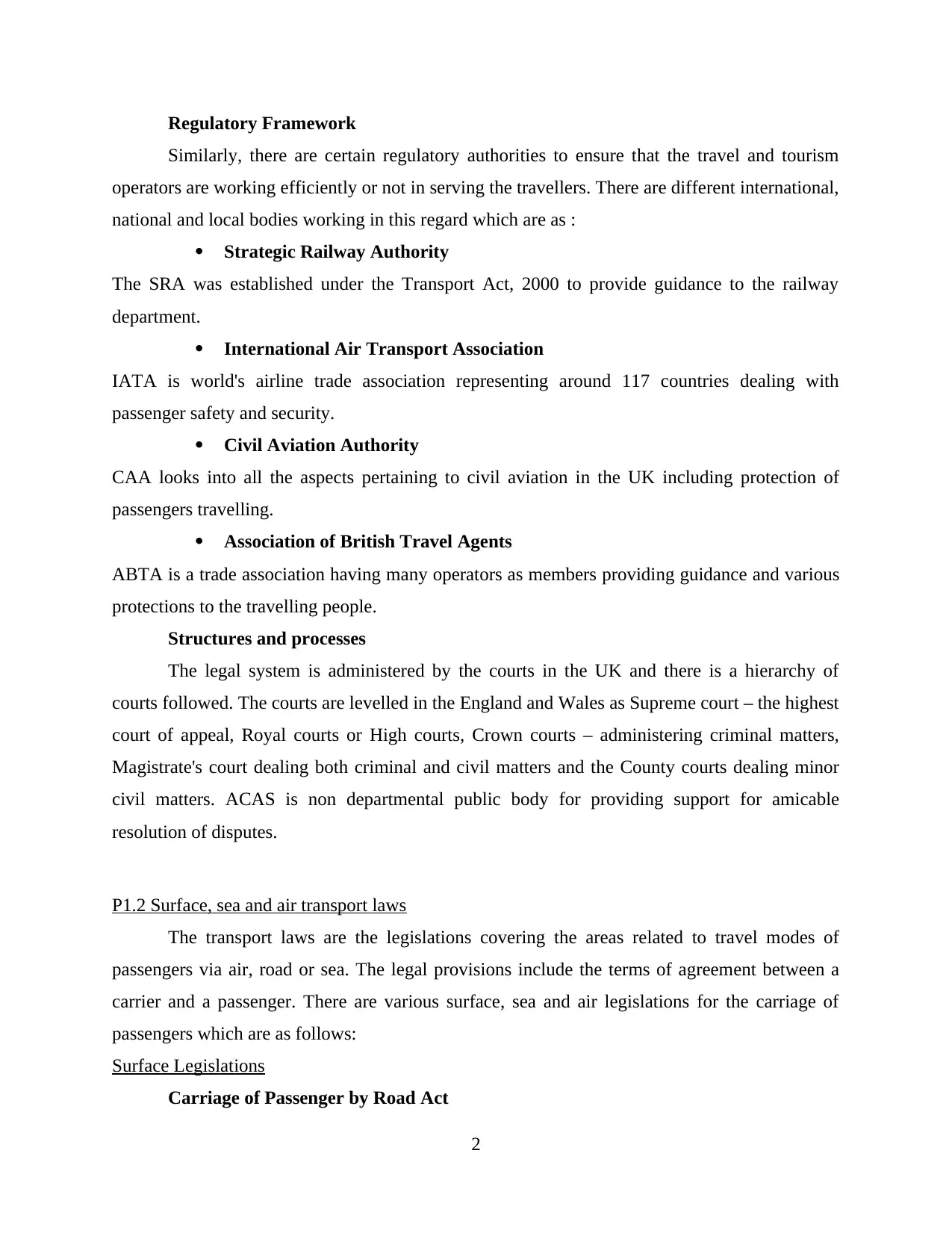
Regulatory Framework
Similarly, there are certain regulatory authorities to ensure that the travel and tourism
operators are working efficiently or not in serving the travellers. There are different international,
national and local bodies working in this regard which are as :
Strategic Railway Authority
The SRA was established under the Transport Act, 2000 to provide guidance to the railway
department.
International Air Transport Association
IATA is world's airline trade association representing around 117 countries dealing with
passenger safety and security.
Civil Aviation Authority
CAA looks into all the aspects pertaining to civil aviation in the UK including protection of
passengers travelling.
Association of British Travel Agents
ABTA is a trade association having many operators as members providing guidance and various
protections to the travelling people.
Structures and processes
The legal system is administered by the courts in the UK and there is a hierarchy of
courts followed. The courts are levelled in the England and Wales as Supreme court – the highest
court of appeal, Royal courts or High courts, Crown courts – administering criminal matters,
Magistrate's court dealing both criminal and civil matters and the County courts dealing minor
civil matters. ACAS is non departmental public body for providing support for amicable
resolution of disputes.
P1.2 Surface, sea and air transport laws
The transport laws are the legislations covering the areas related to travel modes of
passengers via air, road or sea. The legal provisions include the terms of agreement between a
carrier and a passenger. There are various surface, sea and air legislations for the carriage of
passengers which are as follows:
Surface Legislations
Carriage of Passenger by Road Act
2
Similarly, there are certain regulatory authorities to ensure that the travel and tourism
operators are working efficiently or not in serving the travellers. There are different international,
national and local bodies working in this regard which are as :
Strategic Railway Authority
The SRA was established under the Transport Act, 2000 to provide guidance to the railway
department.
International Air Transport Association
IATA is world's airline trade association representing around 117 countries dealing with
passenger safety and security.
Civil Aviation Authority
CAA looks into all the aspects pertaining to civil aviation in the UK including protection of
passengers travelling.
Association of British Travel Agents
ABTA is a trade association having many operators as members providing guidance and various
protections to the travelling people.
Structures and processes
The legal system is administered by the courts in the UK and there is a hierarchy of
courts followed. The courts are levelled in the England and Wales as Supreme court – the highest
court of appeal, Royal courts or High courts, Crown courts – administering criminal matters,
Magistrate's court dealing both criminal and civil matters and the County courts dealing minor
civil matters. ACAS is non departmental public body for providing support for amicable
resolution of disputes.
P1.2 Surface, sea and air transport laws
The transport laws are the legislations covering the areas related to travel modes of
passengers via air, road or sea. The legal provisions include the terms of agreement between a
carrier and a passenger. There are various surface, sea and air legislations for the carriage of
passengers which are as follows:
Surface Legislations
Carriage of Passenger by Road Act
2
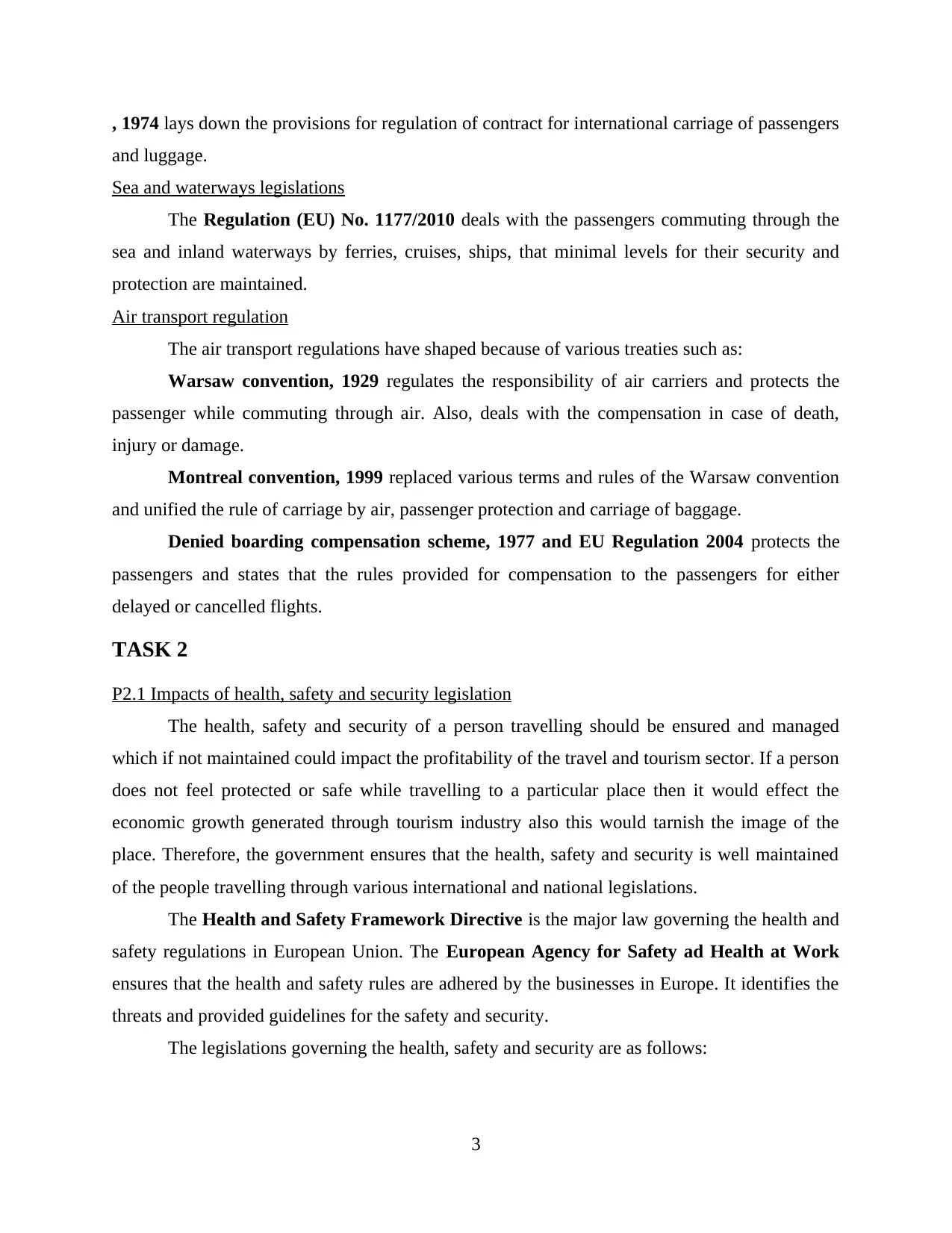
, 1974 lays down the provisions for regulation of contract for international carriage of passengers
and luggage.
Sea and waterways legislations
The Regulation (EU) No. 1177/2010 deals with the passengers commuting through the
sea and inland waterways by ferries, cruises, ships, that minimal levels for their security and
protection are maintained.
Air transport regulation
The air transport regulations have shaped because of various treaties such as:
Warsaw convention, 1929 regulates the responsibility of air carriers and protects the
passenger while commuting through air. Also, deals with the compensation in case of death,
injury or damage.
Montreal convention, 1999 replaced various terms and rules of the Warsaw convention
and unified the rule of carriage by air, passenger protection and carriage of baggage.
Denied boarding compensation scheme, 1977 and EU Regulation 2004 protects the
passengers and states that the rules provided for compensation to the passengers for either
delayed or cancelled flights.
TASK 2
P2.1 Impacts of health, safety and security legislation
The health, safety and security of a person travelling should be ensured and managed
which if not maintained could impact the profitability of the travel and tourism sector. If a person
does not feel protected or safe while travelling to a particular place then it would effect the
economic growth generated through tourism industry also this would tarnish the image of the
place. Therefore, the government ensures that the health, safety and security is well maintained
of the people travelling through various international and national legislations.
The Health and Safety Framework Directive is the major law governing the health and
safety regulations in European Union. The European Agency for Safety ad Health at Work
ensures that the health and safety rules are adhered by the businesses in Europe. It identifies the
threats and provided guidelines for the safety and security.
The legislations governing the health, safety and security are as follows:
3
and luggage.
Sea and waterways legislations
The Regulation (EU) No. 1177/2010 deals with the passengers commuting through the
sea and inland waterways by ferries, cruises, ships, that minimal levels for their security and
protection are maintained.
Air transport regulation
The air transport regulations have shaped because of various treaties such as:
Warsaw convention, 1929 regulates the responsibility of air carriers and protects the
passenger while commuting through air. Also, deals with the compensation in case of death,
injury or damage.
Montreal convention, 1999 replaced various terms and rules of the Warsaw convention
and unified the rule of carriage by air, passenger protection and carriage of baggage.
Denied boarding compensation scheme, 1977 and EU Regulation 2004 protects the
passengers and states that the rules provided for compensation to the passengers for either
delayed or cancelled flights.
TASK 2
P2.1 Impacts of health, safety and security legislation
The health, safety and security of a person travelling should be ensured and managed
which if not maintained could impact the profitability of the travel and tourism sector. If a person
does not feel protected or safe while travelling to a particular place then it would effect the
economic growth generated through tourism industry also this would tarnish the image of the
place. Therefore, the government ensures that the health, safety and security is well maintained
of the people travelling through various international and national legislations.
The Health and Safety Framework Directive is the major law governing the health and
safety regulations in European Union. The European Agency for Safety ad Health at Work
ensures that the health and safety rules are adhered by the businesses in Europe. It identifies the
threats and provided guidelines for the safety and security.
The legislations governing the health, safety and security are as follows:
3
⊘ This is a preview!⊘
Do you want full access?
Subscribe today to unlock all pages.

Trusted by 1+ million students worldwide
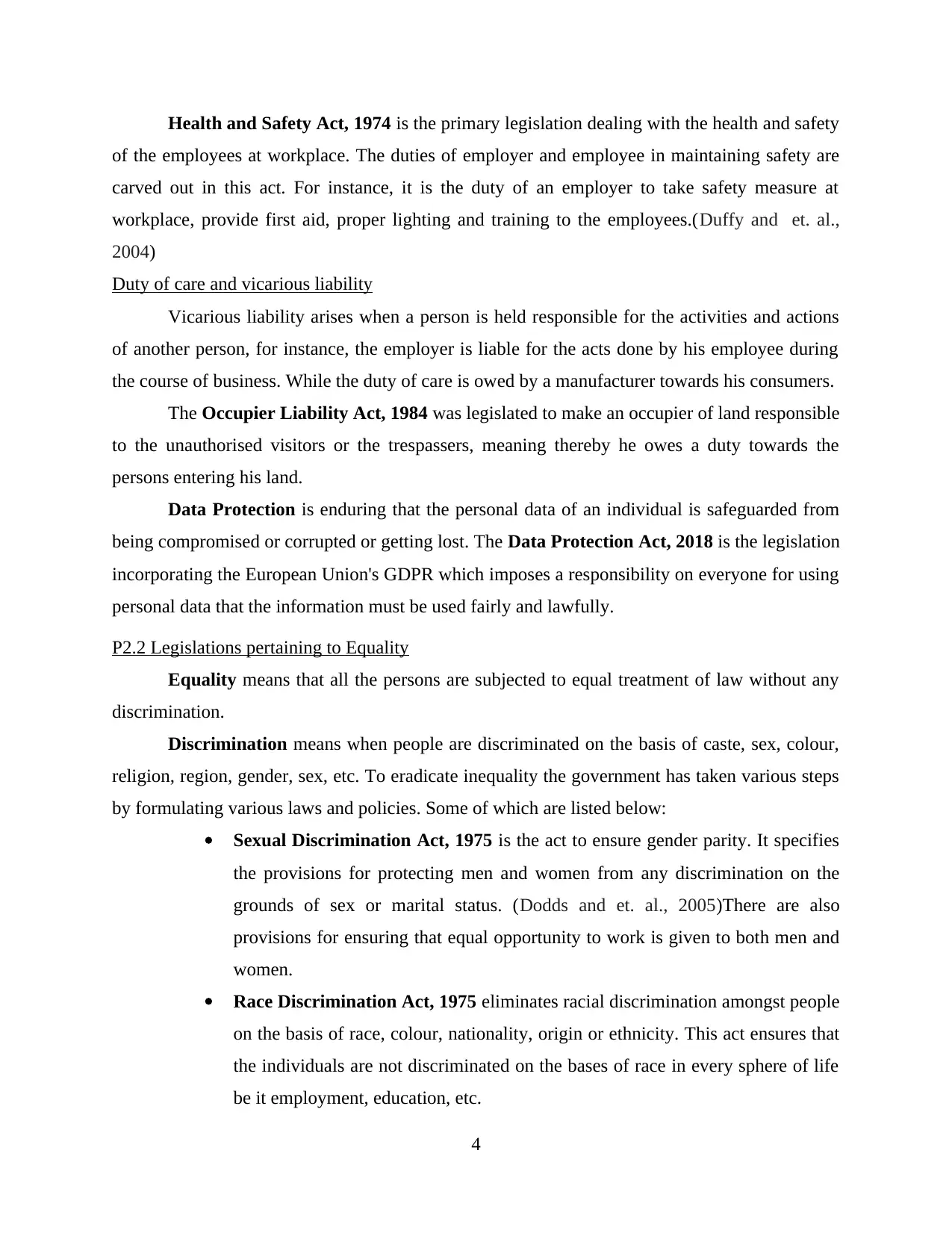
Health and Safety Act, 1974 is the primary legislation dealing with the health and safety
of the employees at workplace. The duties of employer and employee in maintaining safety are
carved out in this act. For instance, it is the duty of an employer to take safety measure at
workplace, provide first aid, proper lighting and training to the employees.(Duffy and et. al.,
2004)
Duty of care and vicarious liability
Vicarious liability arises when a person is held responsible for the activities and actions
of another person, for instance, the employer is liable for the acts done by his employee during
the course of business. While the duty of care is owed by a manufacturer towards his consumers.
The Occupier Liability Act, 1984 was legislated to make an occupier of land responsible
to the unauthorised visitors or the trespassers, meaning thereby he owes a duty towards the
persons entering his land.
Data Protection is enduring that the personal data of an individual is safeguarded from
being compromised or corrupted or getting lost. The Data Protection Act, 2018 is the legislation
incorporating the European Union's GDPR which imposes a responsibility on everyone for using
personal data that the information must be used fairly and lawfully.
P2.2 Legislations pertaining to Equality
Equality means that all the persons are subjected to equal treatment of law without any
discrimination.
Discrimination means when people are discriminated on the basis of caste, sex, colour,
religion, region, gender, sex, etc. To eradicate inequality the government has taken various steps
by formulating various laws and policies. Some of which are listed below:
Sexual Discrimination Act, 1975 is the act to ensure gender parity. It specifies
the provisions for protecting men and women from any discrimination on the
grounds of sex or marital status. (Dodds and et. al., 2005)There are also
provisions for ensuring that equal opportunity to work is given to both men and
women.
Race Discrimination Act, 1975 eliminates racial discrimination amongst people
on the basis of race, colour, nationality, origin or ethnicity. This act ensures that
the individuals are not discriminated on the bases of race in every sphere of life
be it employment, education, etc.
4
of the employees at workplace. The duties of employer and employee in maintaining safety are
carved out in this act. For instance, it is the duty of an employer to take safety measure at
workplace, provide first aid, proper lighting and training to the employees.(Duffy and et. al.,
2004)
Duty of care and vicarious liability
Vicarious liability arises when a person is held responsible for the activities and actions
of another person, for instance, the employer is liable for the acts done by his employee during
the course of business. While the duty of care is owed by a manufacturer towards his consumers.
The Occupier Liability Act, 1984 was legislated to make an occupier of land responsible
to the unauthorised visitors or the trespassers, meaning thereby he owes a duty towards the
persons entering his land.
Data Protection is enduring that the personal data of an individual is safeguarded from
being compromised or corrupted or getting lost. The Data Protection Act, 2018 is the legislation
incorporating the European Union's GDPR which imposes a responsibility on everyone for using
personal data that the information must be used fairly and lawfully.
P2.2 Legislations pertaining to Equality
Equality means that all the persons are subjected to equal treatment of law without any
discrimination.
Discrimination means when people are discriminated on the basis of caste, sex, colour,
religion, region, gender, sex, etc. To eradicate inequality the government has taken various steps
by formulating various laws and policies. Some of which are listed below:
Sexual Discrimination Act, 1975 is the act to ensure gender parity. It specifies
the provisions for protecting men and women from any discrimination on the
grounds of sex or marital status. (Dodds and et. al., 2005)There are also
provisions for ensuring that equal opportunity to work is given to both men and
women.
Race Discrimination Act, 1975 eliminates racial discrimination amongst people
on the basis of race, colour, nationality, origin or ethnicity. This act ensures that
the individuals are not discriminated on the bases of race in every sphere of life
be it employment, education, etc.
4
Paraphrase This Document
Need a fresh take? Get an instant paraphrase of this document with our AI Paraphraser
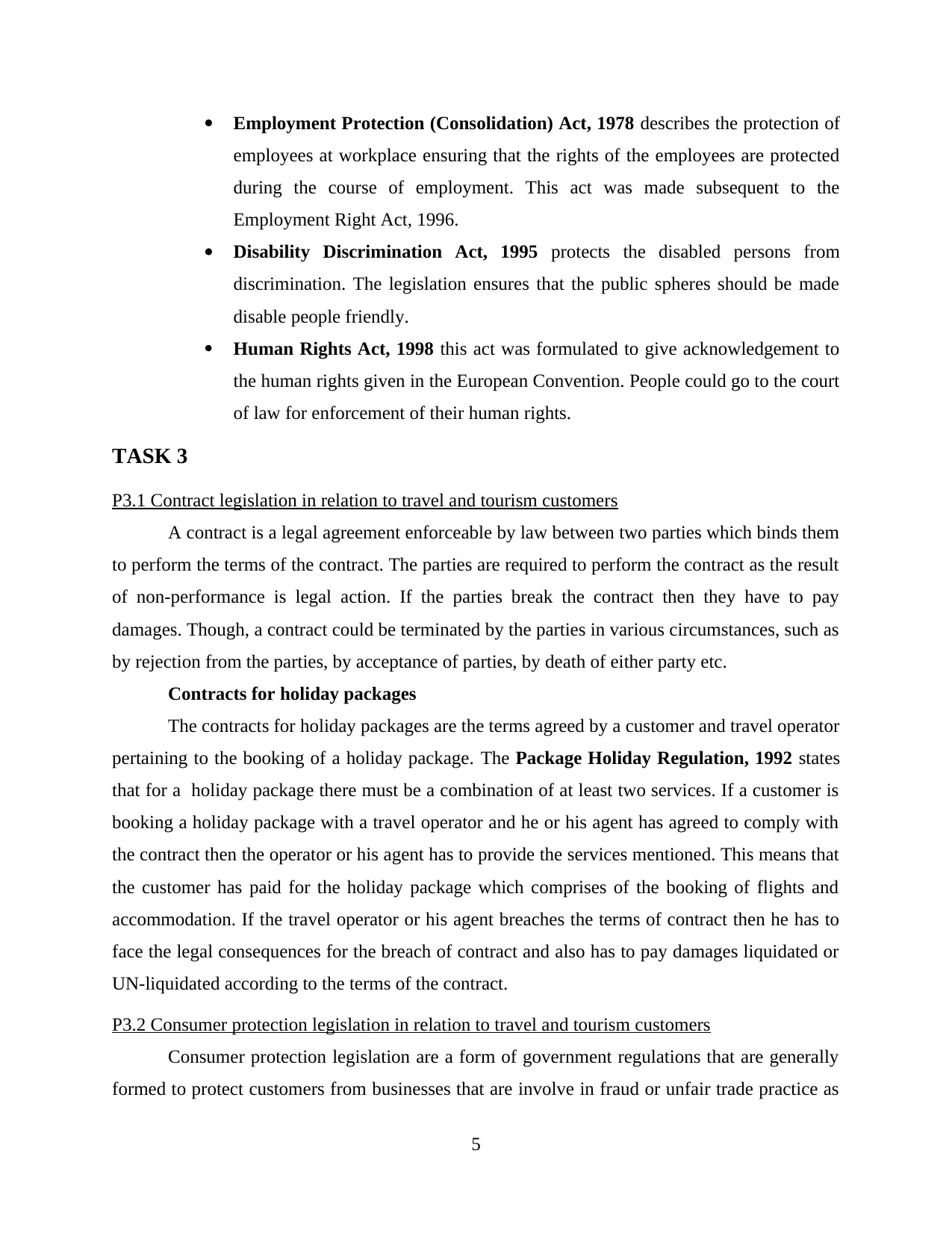
Employment Protection (Consolidation) Act, 1978 describes the protection of
employees at workplace ensuring that the rights of the employees are protected
during the course of employment. This act was made subsequent to the
Employment Right Act, 1996.
Disability Discrimination Act, 1995 protects the disabled persons from
discrimination. The legislation ensures that the public spheres should be made
disable people friendly.
Human Rights Act, 1998 this act was formulated to give acknowledgement to
the human rights given in the European Convention. People could go to the court
of law for enforcement of their human rights.
TASK 3
P3.1 Contract legislation in relation to travel and tourism customers
A contract is a legal agreement enforceable by law between two parties which binds them
to perform the terms of the contract. The parties are required to perform the contract as the result
of non-performance is legal action. If the parties break the contract then they have to pay
damages. Though, a contract could be terminated by the parties in various circumstances, such as
by rejection from the parties, by acceptance of parties, by death of either party etc.
Contracts for holiday packages
The contracts for holiday packages are the terms agreed by a customer and travel operator
pertaining to the booking of a holiday package. The Package Holiday Regulation, 1992 states
that for a holiday package there must be a combination of at least two services. If a customer is
booking a holiday package with a travel operator and he or his agent has agreed to comply with
the contract then the operator or his agent has to provide the services mentioned. This means that
the customer has paid for the holiday package which comprises of the booking of flights and
accommodation. If the travel operator or his agent breaches the terms of contract then he has to
face the legal consequences for the breach of contract and also has to pay damages liquidated or
UN-liquidated according to the terms of the contract.
P3.2 Consumer protection legislation in relation to travel and tourism customers
Consumer protection legislation are a form of government regulations that are generally
formed to protect customers from businesses that are involve in fraud or unfair trade practice as
5
employees at workplace ensuring that the rights of the employees are protected
during the course of employment. This act was made subsequent to the
Employment Right Act, 1996.
Disability Discrimination Act, 1995 protects the disabled persons from
discrimination. The legislation ensures that the public spheres should be made
disable people friendly.
Human Rights Act, 1998 this act was formulated to give acknowledgement to
the human rights given in the European Convention. People could go to the court
of law for enforcement of their human rights.
TASK 3
P3.1 Contract legislation in relation to travel and tourism customers
A contract is a legal agreement enforceable by law between two parties which binds them
to perform the terms of the contract. The parties are required to perform the contract as the result
of non-performance is legal action. If the parties break the contract then they have to pay
damages. Though, a contract could be terminated by the parties in various circumstances, such as
by rejection from the parties, by acceptance of parties, by death of either party etc.
Contracts for holiday packages
The contracts for holiday packages are the terms agreed by a customer and travel operator
pertaining to the booking of a holiday package. The Package Holiday Regulation, 1992 states
that for a holiday package there must be a combination of at least two services. If a customer is
booking a holiday package with a travel operator and he or his agent has agreed to comply with
the contract then the operator or his agent has to provide the services mentioned. This means that
the customer has paid for the holiday package which comprises of the booking of flights and
accommodation. If the travel operator or his agent breaches the terms of contract then he has to
face the legal consequences for the breach of contract and also has to pay damages liquidated or
UN-liquidated according to the terms of the contract.
P3.2 Consumer protection legislation in relation to travel and tourism customers
Consumer protection legislation are a form of government regulations that are generally
formed to protect customers from businesses that are involve in fraud or unfair trade practice as
5
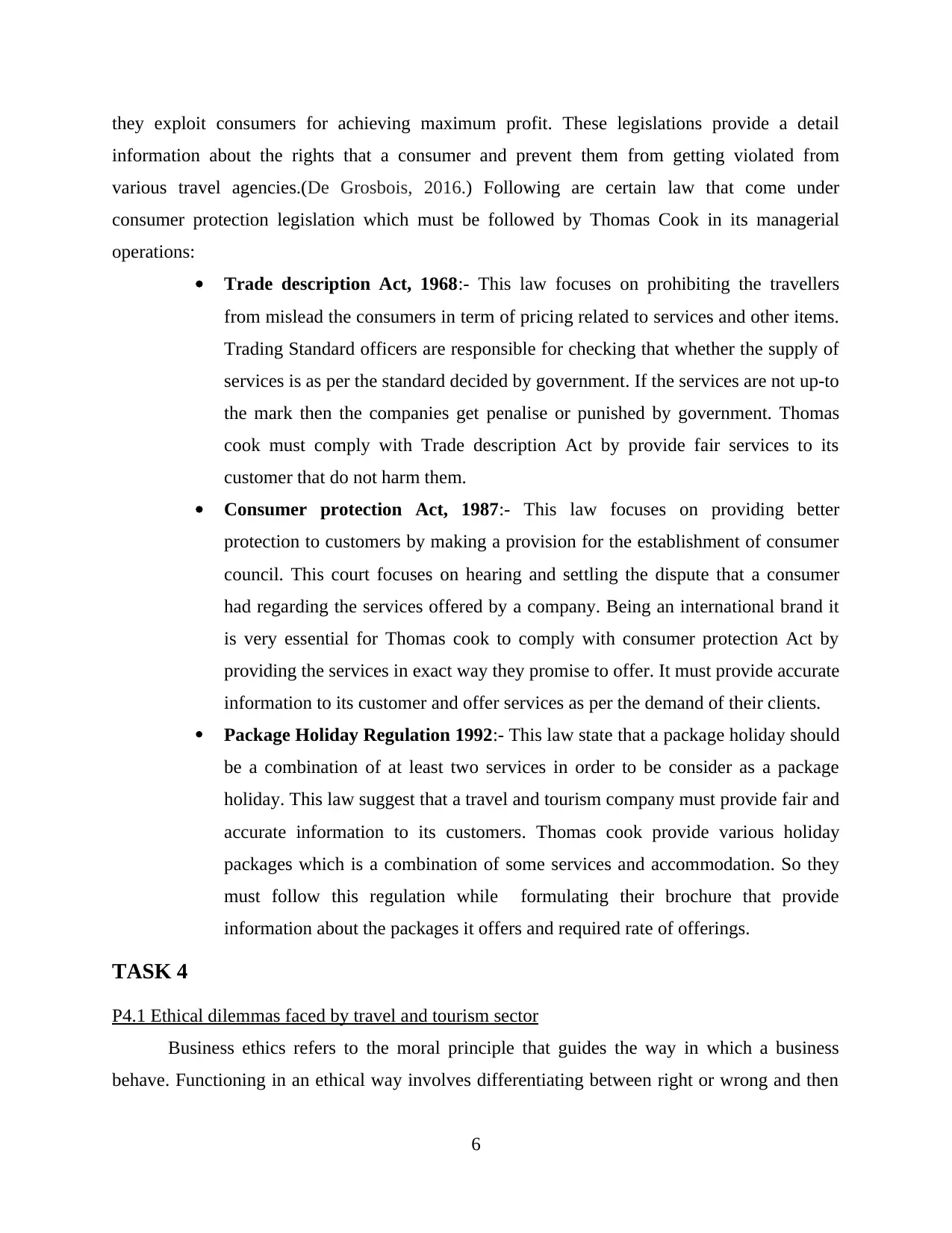
they exploit consumers for achieving maximum profit. These legislations provide a detail
information about the rights that a consumer and prevent them from getting violated from
various travel agencies.(De Grosbois, 2016.) Following are certain law that come under
consumer protection legislation which must be followed by Thomas Cook in its managerial
operations:
Trade description Act, 1968:- This law focuses on prohibiting the travellers
from mislead the consumers in term of pricing related to services and other items.
Trading Standard officers are responsible for checking that whether the supply of
services is as per the standard decided by government. If the services are not up-to
the mark then the companies get penalise or punished by government. Thomas
cook must comply with Trade description Act by provide fair services to its
customer that do not harm them.
Consumer protection Act, 1987:- This law focuses on providing better
protection to customers by making a provision for the establishment of consumer
council. This court focuses on hearing and settling the dispute that a consumer
had regarding the services offered by a company. Being an international brand it
is very essential for Thomas cook to comply with consumer protection Act by
providing the services in exact way they promise to offer. It must provide accurate
information to its customer and offer services as per the demand of their clients.
Package Holiday Regulation 1992:- This law state that a package holiday should
be a combination of at least two services in order to be consider as a package
holiday. This law suggest that a travel and tourism company must provide fair and
accurate information to its customers. Thomas cook provide various holiday
packages which is a combination of some services and accommodation. So they
must follow this regulation while formulating their brochure that provide
information about the packages it offers and required rate of offerings.
TASK 4
P4.1 Ethical dilemmas faced by travel and tourism sector
Business ethics refers to the moral principle that guides the way in which a business
behave. Functioning in an ethical way involves differentiating between right or wrong and then
6
information about the rights that a consumer and prevent them from getting violated from
various travel agencies.(De Grosbois, 2016.) Following are certain law that come under
consumer protection legislation which must be followed by Thomas Cook in its managerial
operations:
Trade description Act, 1968:- This law focuses on prohibiting the travellers
from mislead the consumers in term of pricing related to services and other items.
Trading Standard officers are responsible for checking that whether the supply of
services is as per the standard decided by government. If the services are not up-to
the mark then the companies get penalise or punished by government. Thomas
cook must comply with Trade description Act by provide fair services to its
customer that do not harm them.
Consumer protection Act, 1987:- This law focuses on providing better
protection to customers by making a provision for the establishment of consumer
council. This court focuses on hearing and settling the dispute that a consumer
had regarding the services offered by a company. Being an international brand it
is very essential for Thomas cook to comply with consumer protection Act by
providing the services in exact way they promise to offer. It must provide accurate
information to its customer and offer services as per the demand of their clients.
Package Holiday Regulation 1992:- This law state that a package holiday should
be a combination of at least two services in order to be consider as a package
holiday. This law suggest that a travel and tourism company must provide fair and
accurate information to its customers. Thomas cook provide various holiday
packages which is a combination of some services and accommodation. So they
must follow this regulation while formulating their brochure that provide
information about the packages it offers and required rate of offerings.
TASK 4
P4.1 Ethical dilemmas faced by travel and tourism sector
Business ethics refers to the moral principle that guides the way in which a business
behave. Functioning in an ethical way involves differentiating between right or wrong and then
6
⊘ This is a preview!⊘
Do you want full access?
Subscribe today to unlock all pages.

Trusted by 1+ million students worldwide
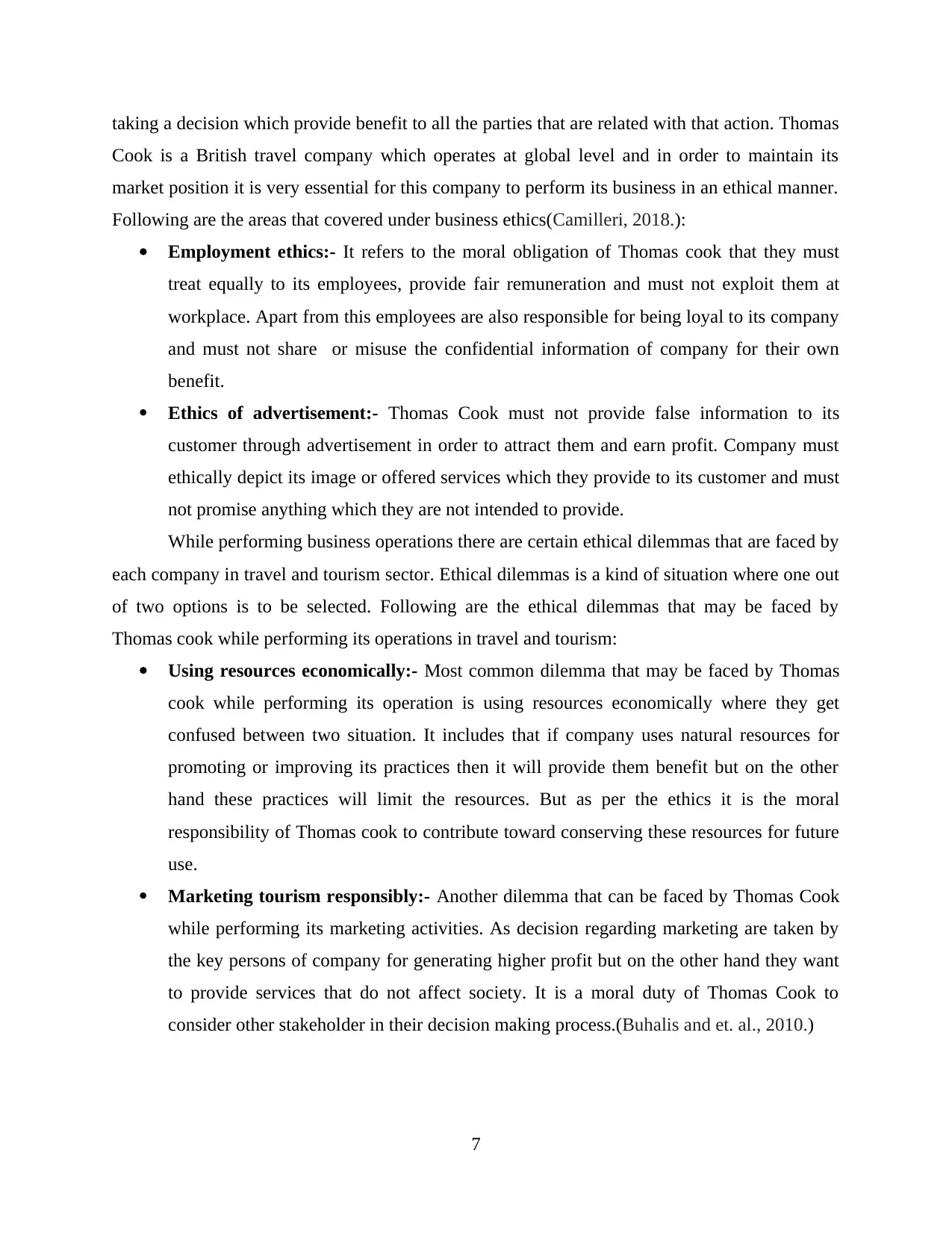
taking a decision which provide benefit to all the parties that are related with that action. Thomas
Cook is a British travel company which operates at global level and in order to maintain its
market position it is very essential for this company to perform its business in an ethical manner.
Following are the areas that covered under business ethics(Camilleri, 2018.):
Employment ethics:- It refers to the moral obligation of Thomas cook that they must
treat equally to its employees, provide fair remuneration and must not exploit them at
workplace. Apart from this employees are also responsible for being loyal to its company
and must not share or misuse the confidential information of company for their own
benefit.
Ethics of advertisement:- Thomas Cook must not provide false information to its
customer through advertisement in order to attract them and earn profit. Company must
ethically depict its image or offered services which they provide to its customer and must
not promise anything which they are not intended to provide.
While performing business operations there are certain ethical dilemmas that are faced by
each company in travel and tourism sector. Ethical dilemmas is a kind of situation where one out
of two options is to be selected. Following are the ethical dilemmas that may be faced by
Thomas cook while performing its operations in travel and tourism:
Using resources economically:- Most common dilemma that may be faced by Thomas
cook while performing its operation is using resources economically where they get
confused between two situation. It includes that if company uses natural resources for
promoting or improving its practices then it will provide them benefit but on the other
hand these practices will limit the resources. But as per the ethics it is the moral
responsibility of Thomas cook to contribute toward conserving these resources for future
use.
Marketing tourism responsibly:- Another dilemma that can be faced by Thomas Cook
while performing its marketing activities. As decision regarding marketing are taken by
the key persons of company for generating higher profit but on the other hand they want
to provide services that do not affect society. It is a moral duty of Thomas Cook to
consider other stakeholder in their decision making process.(Buhalis and et. al., 2010.)
7
Cook is a British travel company which operates at global level and in order to maintain its
market position it is very essential for this company to perform its business in an ethical manner.
Following are the areas that covered under business ethics(Camilleri, 2018.):
Employment ethics:- It refers to the moral obligation of Thomas cook that they must
treat equally to its employees, provide fair remuneration and must not exploit them at
workplace. Apart from this employees are also responsible for being loyal to its company
and must not share or misuse the confidential information of company for their own
benefit.
Ethics of advertisement:- Thomas Cook must not provide false information to its
customer through advertisement in order to attract them and earn profit. Company must
ethically depict its image or offered services which they provide to its customer and must
not promise anything which they are not intended to provide.
While performing business operations there are certain ethical dilemmas that are faced by
each company in travel and tourism sector. Ethical dilemmas is a kind of situation where one out
of two options is to be selected. Following are the ethical dilemmas that may be faced by
Thomas cook while performing its operations in travel and tourism:
Using resources economically:- Most common dilemma that may be faced by Thomas
cook while performing its operation is using resources economically where they get
confused between two situation. It includes that if company uses natural resources for
promoting or improving its practices then it will provide them benefit but on the other
hand these practices will limit the resources. But as per the ethics it is the moral
responsibility of Thomas cook to contribute toward conserving these resources for future
use.
Marketing tourism responsibly:- Another dilemma that can be faced by Thomas Cook
while performing its marketing activities. As decision regarding marketing are taken by
the key persons of company for generating higher profit but on the other hand they want
to provide services that do not affect society. It is a moral duty of Thomas Cook to
consider other stakeholder in their decision making process.(Buhalis and et. al., 2010.)
7
Paraphrase This Document
Need a fresh take? Get an instant paraphrase of this document with our AI Paraphraser
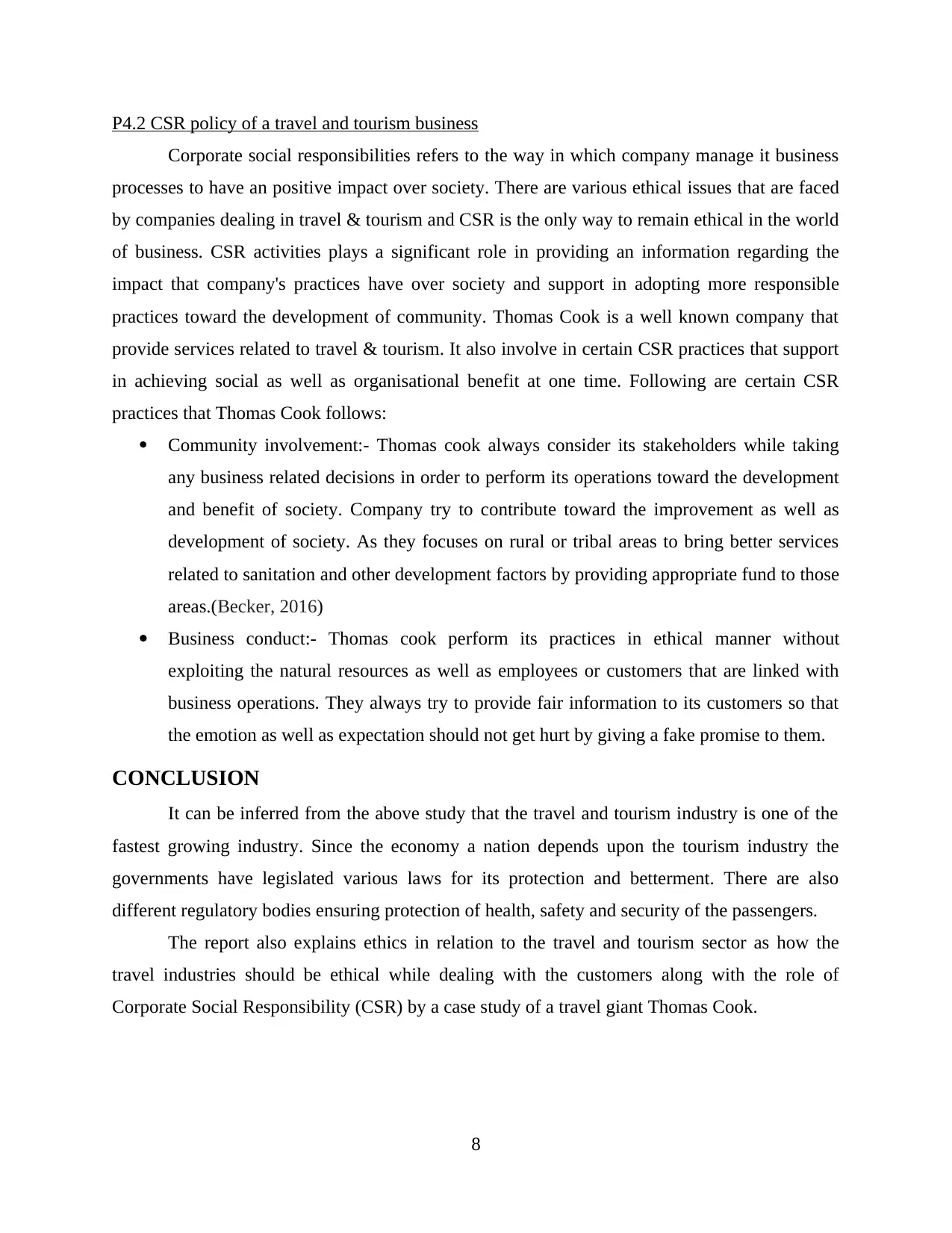
P4.2 CSR policy of a travel and tourism business
Corporate social responsibilities refers to the way in which company manage it business
processes to have an positive impact over society. There are various ethical issues that are faced
by companies dealing in travel & tourism and CSR is the only way to remain ethical in the world
of business. CSR activities plays a significant role in providing an information regarding the
impact that company's practices have over society and support in adopting more responsible
practices toward the development of community. Thomas Cook is a well known company that
provide services related to travel & tourism. It also involve in certain CSR practices that support
in achieving social as well as organisational benefit at one time. Following are certain CSR
practices that Thomas Cook follows:
Community involvement:- Thomas cook always consider its stakeholders while taking
any business related decisions in order to perform its operations toward the development
and benefit of society. Company try to contribute toward the improvement as well as
development of society. As they focuses on rural or tribal areas to bring better services
related to sanitation and other development factors by providing appropriate fund to those
areas.(Becker, 2016)
Business conduct:- Thomas cook perform its practices in ethical manner without
exploiting the natural resources as well as employees or customers that are linked with
business operations. They always try to provide fair information to its customers so that
the emotion as well as expectation should not get hurt by giving a fake promise to them.
CONCLUSION
It can be inferred from the above study that the travel and tourism industry is one of the
fastest growing industry. Since the economy a nation depends upon the tourism industry the
governments have legislated various laws for its protection and betterment. There are also
different regulatory bodies ensuring protection of health, safety and security of the passengers.
The report also explains ethics in relation to the travel and tourism sector as how the
travel industries should be ethical while dealing with the customers along with the role of
Corporate Social Responsibility (CSR) by a case study of a travel giant Thomas Cook.
8
Corporate social responsibilities refers to the way in which company manage it business
processes to have an positive impact over society. There are various ethical issues that are faced
by companies dealing in travel & tourism and CSR is the only way to remain ethical in the world
of business. CSR activities plays a significant role in providing an information regarding the
impact that company's practices have over society and support in adopting more responsible
practices toward the development of community. Thomas Cook is a well known company that
provide services related to travel & tourism. It also involve in certain CSR practices that support
in achieving social as well as organisational benefit at one time. Following are certain CSR
practices that Thomas Cook follows:
Community involvement:- Thomas cook always consider its stakeholders while taking
any business related decisions in order to perform its operations toward the development
and benefit of society. Company try to contribute toward the improvement as well as
development of society. As they focuses on rural or tribal areas to bring better services
related to sanitation and other development factors by providing appropriate fund to those
areas.(Becker, 2016)
Business conduct:- Thomas cook perform its practices in ethical manner without
exploiting the natural resources as well as employees or customers that are linked with
business operations. They always try to provide fair information to its customers so that
the emotion as well as expectation should not get hurt by giving a fake promise to them.
CONCLUSION
It can be inferred from the above study that the travel and tourism industry is one of the
fastest growing industry. Since the economy a nation depends upon the tourism industry the
governments have legislated various laws for its protection and betterment. There are also
different regulatory bodies ensuring protection of health, safety and security of the passengers.
The report also explains ethics in relation to the travel and tourism sector as how the
travel industries should be ethical while dealing with the customers along with the role of
Corporate Social Responsibility (CSR) by a case study of a travel giant Thomas Cook.
8
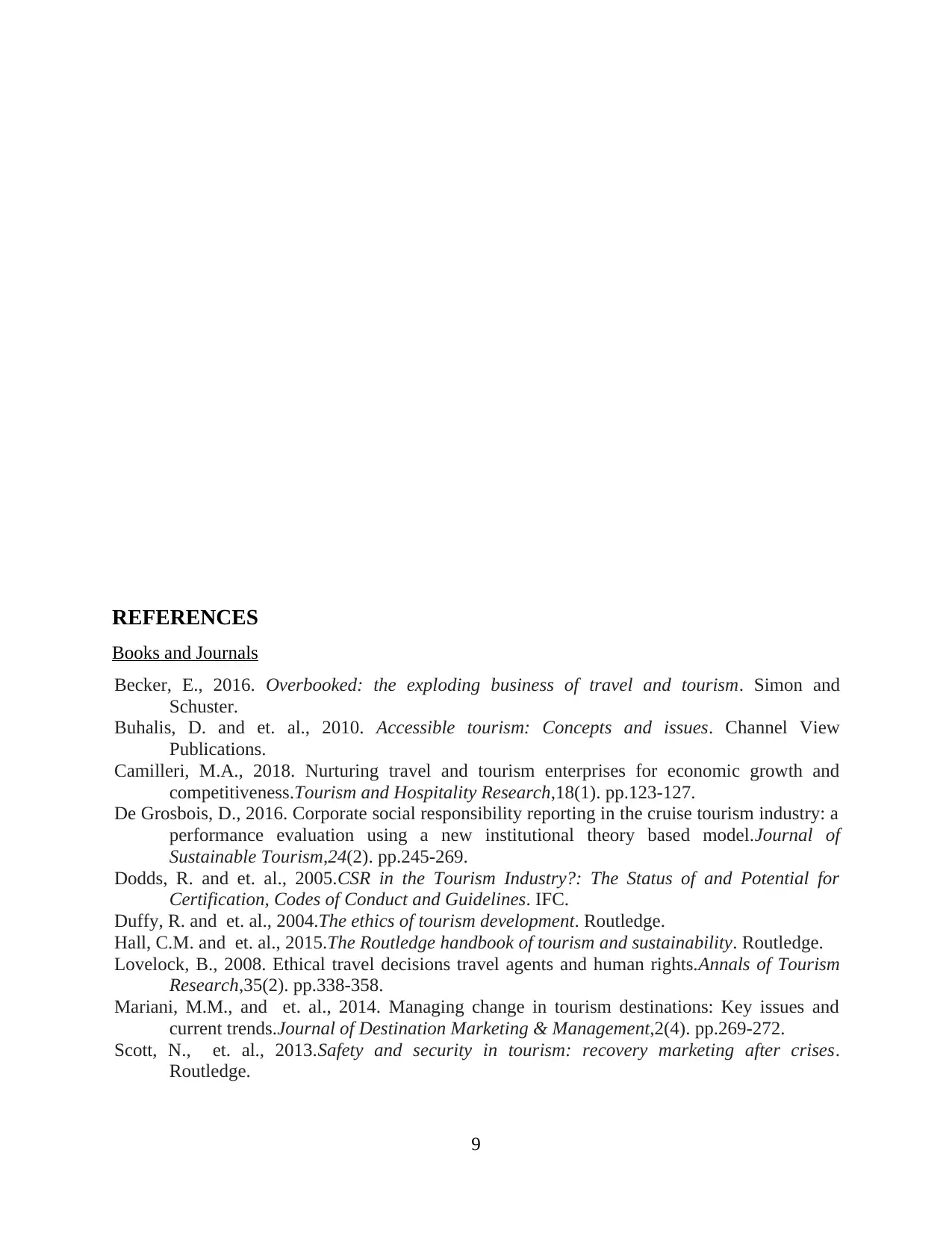
REFERENCES
Books and Journals
Becker, E., 2016. Overbooked: the exploding business of travel and tourism. Simon and
Schuster.
Buhalis, D. and et. al., 2010. Accessible tourism: Concepts and issues. Channel View
Publications.
Camilleri, M.A., 2018. Nurturing travel and tourism enterprises for economic growth and
competitiveness.Tourism and Hospitality Research,18(1). pp.123-127.
De Grosbois, D., 2016. Corporate social responsibility reporting in the cruise tourism industry: a
performance evaluation using a new institutional theory based model.Journal of
Sustainable Tourism,24(2). pp.245-269.
Dodds, R. and et. al., 2005.CSR in the Tourism Industry?: The Status of and Potential for
Certification, Codes of Conduct and Guidelines. IFC.
Duffy, R. and et. al., 2004.The ethics of tourism development. Routledge.
Hall, C.M. and et. al., 2015.The Routledge handbook of tourism and sustainability. Routledge.
Lovelock, B., 2008. Ethical travel decisions travel agents and human rights.Annals of Tourism
Research,35(2). pp.338-358.
Mariani, M.M., and et. al., 2014. Managing change in tourism destinations: Key issues and
current trends.Journal of Destination Marketing & Management,2(4). pp.269-272.
Scott, N., et. al., 2013.Safety and security in tourism: recovery marketing after crises.
Routledge.
9
Books and Journals
Becker, E., 2016. Overbooked: the exploding business of travel and tourism. Simon and
Schuster.
Buhalis, D. and et. al., 2010. Accessible tourism: Concepts and issues. Channel View
Publications.
Camilleri, M.A., 2018. Nurturing travel and tourism enterprises for economic growth and
competitiveness.Tourism and Hospitality Research,18(1). pp.123-127.
De Grosbois, D., 2016. Corporate social responsibility reporting in the cruise tourism industry: a
performance evaluation using a new institutional theory based model.Journal of
Sustainable Tourism,24(2). pp.245-269.
Dodds, R. and et. al., 2005.CSR in the Tourism Industry?: The Status of and Potential for
Certification, Codes of Conduct and Guidelines. IFC.
Duffy, R. and et. al., 2004.The ethics of tourism development. Routledge.
Hall, C.M. and et. al., 2015.The Routledge handbook of tourism and sustainability. Routledge.
Lovelock, B., 2008. Ethical travel decisions travel agents and human rights.Annals of Tourism
Research,35(2). pp.338-358.
Mariani, M.M., and et. al., 2014. Managing change in tourism destinations: Key issues and
current trends.Journal of Destination Marketing & Management,2(4). pp.269-272.
Scott, N., et. al., 2013.Safety and security in tourism: recovery marketing after crises.
Routledge.
9
⊘ This is a preview!⊘
Do you want full access?
Subscribe today to unlock all pages.

Trusted by 1+ million students worldwide
1 out of 13
Related Documents
Your All-in-One AI-Powered Toolkit for Academic Success.
+13062052269
info@desklib.com
Available 24*7 on WhatsApp / Email
![[object Object]](/_next/static/media/star-bottom.7253800d.svg)
Unlock your academic potential
Copyright © 2020–2026 A2Z Services. All Rights Reserved. Developed and managed by ZUCOL.





